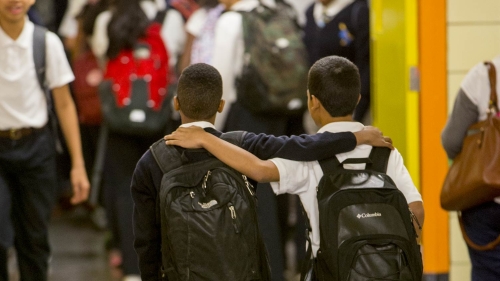In the aftermath of the COVID-19 pandemic and a year and a half of remote school instruction, student learning has been significantly disrupted for K-12 students across the entirety of North America. Standardized testing results from the year 2022 reveal that the pandemic and its online learning options left student learning largely unfinished across the country. A national district level analysis of pandemic recovery found that “the average student in grades 3 through 8 had lost the equivalent of half a grade level in math achievement and a third of a grade level in reading achievement.” The pandemic also widened pre-existing opportunity and achievement gaps for historically disadvantaged and minority students. Remote learning models further exacerbated chronic absenteeism, increased mental health concerns, and lowered student performance. The academic decline that students experienced a few years ago with remote learning during the height of the U.S. COVID-19 pandemic now has educators and policymakers exhaustively working to support opportunities for the academic and socio-emotional growth of students. One of the opportunities to garner greater attention to student growth and development is summer learning programs.
During the summer months, research shows that, after the conclusion of the traditional public school year, low-income and non-white students fall behind academically compared with their more-affluent and white peers. The months of June, July and August provide an opportunity for high-quality learning and enrichment opportunities to take hold. Research confirms that voluntary summer learning programs furnish students of color and low-income youth with the occasion to accelerate gains and address learning gaps. If students attend well-planned, high-quality summer programs consistently, they can improve their math and language arts test scores and social-emotional skills. Holistic summer programs can also provide cultural exposure, field trips, career and college readiness and other enriching opportunities that students, particularly low-income students, might not have access to otherwise.
In an effort to combat future learning gaps amongst today’s students, the Federal government has allocated monies to summer programs through the post-pandemic Elementary and Secondary School Emergency Relief Fund (ESSER). Now, more than ever before, districts are in a unique position to design fun, enriching summer programs that address learning inequities and engage students holistically.
Beginning in 2022, the Center for Policy, Research, and Evaluation (PRE) at NYU Metro Center, in partnership with The Wallace Foundation, agreed to conduct research examining how districts across the US plan and implement high-quality, equity-centered summer programs.
This multi-year qualitative study will focus on approximately 100 districts within the District Summer Learning Network (DSLN) – an initiative led by FHI 360 wherein over districts (and some states) receive professional support and technical assistance to help them design and sustain high-quality summer learning programs. DSLN encourages districts to shift away from traditional “summer school” that focuses on remediation, to more holistic summer learning programs that accelerate learning. Coaches and experts within DSLN help districts maximize the potential of these summer programs with a focus on evidence-based practices, academic quality, equity, whole child development, and strong community partnerships.
During the first two years of the District Summer Learning Network study, researchers from the Center for Policy, Research, and Evaluation focused on understanding how districts and their community partners design and implement summer plans and programming that support young people, particularly those from historically marginalized communities. Now in the third year of the DSLN Initiative, the PRE team hopes to understand how districts plan to sustain summer programs long-term and the role of state-level agencies in summer learning.
After two years, the Center for Policy, Research, and Evaluation will share its first set of publications from the District Summer Learning Network Research Initiative, known as PRE’s Summer Snapshot series. This multi-part thematic series will lift up exemplary practices and unique approaches of school districts around summer learning in under-represented topic areas, such as rural summer learning and programs that go beyond credit recovery to support high school students.

